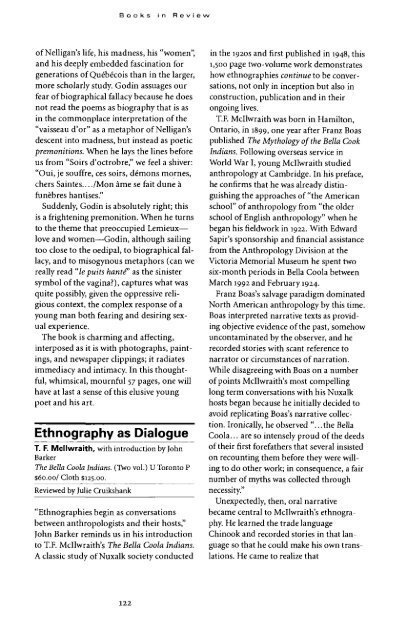To All Appearances A Lady - University of British Columbia
To All Appearances A Lady - University of British Columbia
To All Appearances A Lady - University of British Columbia
You also want an ePaper? Increase the reach of your titles
YUMPU automatically turns print PDFs into web optimized ePapers that Google loves.
Books in Review<br />
<strong>of</strong> Nelligan's life, his madness, his "women",<br />
and his deeply embedded fascination for<br />
generations <strong>of</strong> Québécois than in the larger,<br />
more scholarly study. Godin assuages our<br />
fear <strong>of</strong> biographical fallacy because he does<br />
not read the poems as biography that is as<br />
in the commonplace interpretation <strong>of</strong> the<br />
"vaisseau d'or" as a metaphor <strong>of</strong> Nelligan's<br />
descent into madness, but instead as poetic<br />
premonitions. When he lays the lines before<br />
us from "Soirs d'octrobre," we feel a shiver:<br />
"Oui, je souffre, ces soirs, démons mornes,<br />
chers Saintes... ./Mon âme se fait dune à<br />
funèbres hantises."<br />
Suddenly, Godin is absolutely right; this<br />
is a frightening premonition. When he turns<br />
to the theme that preoccupied Lemieux—<br />
love and women—Godin, although sailing<br />
too close to the oedipal, to biographical fallacy,<br />
and to misogynous metaphors (can we<br />
really read "le puits hanté" as the sinister<br />
symbol <strong>of</strong> the vagina?), captures what was<br />
quite possibly, given the oppressive religious<br />
context, the complex response <strong>of</strong> a<br />
young man both fearing and desiring sexual<br />
experience.<br />
The book is charming and affecting,<br />
interposed as it is with photographs, paintings,<br />
and newspaper clippings; it radiates<br />
immediacy and intimacy. In this thoughtful,<br />
whimsical, mournful 57 pages, one will<br />
have at last a sense <strong>of</strong> this elusive young<br />
poet and his art.<br />
Ethnography as Dialogue<br />
T. F. Mcllwraith, with introduction by John<br />
Barker<br />
The Bella Coola Indians. (Two vol.) U <strong>To</strong>ronto P<br />
$60.00/ Cloth $125.00.<br />
Reviewed by Julie Cruikshank<br />
"Ethnographies begin as conversations<br />
between anthropologists and their hosts,"<br />
John Barker reminds us in his introduction<br />
to T.F. Mcllwraith's The Bella Coola Indians.<br />
A classic study <strong>of</strong> Nuxalk society conducted<br />
in the 1920s and first published in 1948, this<br />
1,500 page two-volume work demonstrates<br />
how ethnographies continue to be conversations,<br />
not only in inception but also in<br />
construction, publication and in their<br />
ongoing lives.<br />
T.F. Mcllwraith was born in Hamilton,<br />
Ontario, in 1899, one year after Franz Boas<br />
published The Mythology <strong>of</strong> the Bella Cook<br />
Indians. Following overseas service in<br />
World War I, young Mcllwraith studied<br />
anthropology at Cambridge. In his preface,<br />
he confirms that he was already distinguishing<br />
the approaches <strong>of</strong> "the American<br />
school" <strong>of</strong> anthropology from "the older<br />
school <strong>of</strong> English anthropology" when he<br />
began his fieldwork in 1922. With Edward<br />
Sapir's sponsorship and financial assistance<br />
from the Anthropology Division at the<br />
Victoria Memorial Museum he spent two<br />
six-month periods in Bella Coola between<br />
March 1992 and February 1924.<br />
Franz Boas's salvage paradigm dominated<br />
North American anthropology by this time.<br />
Boas interpreted narrative texts as providing<br />
objective evidence <strong>of</strong> the past, somehow<br />
uncontaminated by the observer, and he<br />
recorded stories with scant reference to<br />
narrator or circumstances <strong>of</strong> narration.<br />
While disagreeing with Boas on a number<br />
<strong>of</strong> points Mcllwraith's most compelling<br />
long term conversations with his Nuxalk<br />
hosts began because he initially decided to<br />
avoid replicating Boas's narrative collection.<br />
Ironically, he observed "...the Bella<br />
Coola... are so intensely proud <strong>of</strong> the deeds<br />
<strong>of</strong> their first forefathers that several insisted<br />
on recounting them before they were willing<br />
to do other work; in consequence, a fair<br />
number <strong>of</strong> myths was collected through<br />
necessity."<br />
Unexpectedly, then, oral narrative<br />
became central to Mcllwraith's ethnography.<br />
He learned the trade language<br />
Chinook and recorded stories in that language<br />
so that he could make his own translations.<br />
He came to realize that<br />
122

















